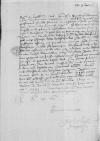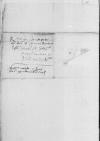List #639
Cornelis DE SCHEPPER do Ioannes DANTISCUSDonauwörth, 1531-06-09
| odebrano Ghent (Gandavum), [1531]-06-30 Rękopiśmienne podstawy źródłowe:
Pomocnicze podstawy źródłowe:
Publikacje:
| ||||||||||||
Tekst + aparat krytyczny + komentarz Zwykły tekst Tekst + komentarz Tekst + aparat krytyczny
Reverendissimo in Christo Patri et Domino, domino
Reverendissime et excellentissime Domine.
Praemissa humili commendatione paper damaged⌈[e]e paper damaged⌉ mea.
Tandem veni
Numquam animo excidet id beneficium, quod mihi praestitisti dato Ecclesiaste tuo, ille enim me solum consolatur efficitque, ne quae res me moveat. Quid sit successurum, nescio, sed principia commissionis meae mihi feliciter orig. foeliciter⌈feliciterfeliciter orig. foeliciter⌉ cesserunt et ad alia neque industria mihi defuit – et citra invidiam dictum velim – neque diligentia. Spero et hanc pescatam me fecisse
Cum
Interim me et mea Reverendissimae Dominationi Vestrae humiliter commendo. Si quid potest huic homini prodesse, quod velle scio, rogo, ne desit occasioni et me eidem humiliter et ex animo commendo.
Dat(ae) or Dat(um)⌈Dat(ae)Dat(ae) or Dat(um)⌉
in
Eiusdem Reverendissimae Dominationis Vestrae humilis inservitor
Postscript:
Commendo et credo Reverendissimae Dominationi Vestrae


 UUB, H. 154, f. 56v
UUB, H. 154, f. 56v